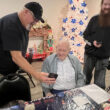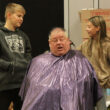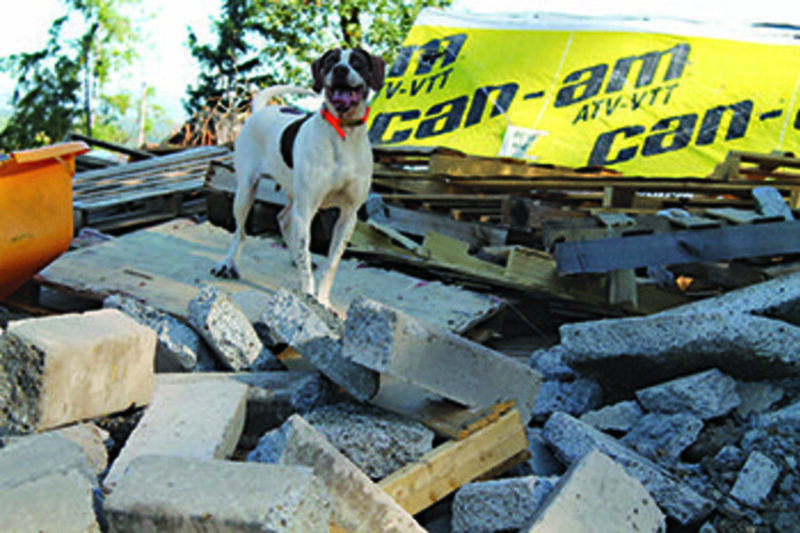Sean C. Morgan
Local trainer joins program to train disaster search dogs:
It takes a special dog to find survivors and victims following disasters, and Kerstin Fulk is preparing her business to begin searching for those dogs in Oregon and northern California.
Fulk owns Field of Dreams Boarding and Training Kennel west of Sweet Home, 29180 Hwy. 20, which hitherto has focused on developing hunting dogs. She is participating in a new program by the National Disaster Search Dog Foundation to locate dogs specially suited to searching in disaster zones.
A small section of her property is covered in a pile of debris – pallets, doors, buckets, bricks, a wheelbarrow – the type of demolition that normally might prompt a visit by a code enforcement officer. The debris is the kind that dogs are likely to encounter on the scene of a disaster, mainly construction materials. Fulk said she has had about two truck loads of concrete and six to seven loads of pallets, she said, and she is looking for more.
Coastal Farms, Wilco, Home Depot, Columbia and Habitat for Humanity have donated material, she said. “Doors, toilet seats – we need stuff to make it look like a tornado, an earthquake or a tsunami has hit. It’s got to be unstable for the dogs, so when it moves, the dog can recover.”
The debris will need to have different textures, with the voids and openings the dogs are likely to encounter on an actual disaster site.
Retired teacher Wilma Melville founded the Search Dog Foundation in 1996 after she had deployed with her dog, certified by the Federal Emergency Management Agency, at the site of the Oklahoma City bombing in 1995. A dog found one survivor, but it was clear that the country had a severe shortage of canine disaster search teams.
Alarmed at the gap in national disaster response network, Melville started the foundation, basing it on recruiting rescued dogs instead of breeding them. The program recruits emergency personnel to handle the dogs, and handlers and dogs receive ongoing training. Their services are offered to fire departments at no cost, and dogs accepted into the program receive lifetime care from the foundation.
No technology matches a dog’s speed and accuracy in finding people trapped in wreckage from a disaster with their sense of smell and ability to ignore noises and other scents. They can navigate unstable and slippery terrain and negotiate dangerous surfaces while focusing on their jobs. They can reach places no human can safely access.
The Search Dog Foundation has trained 150 teams, which have responded to 108 disasters and missing persons searches, including Ground Zero on 9/11. Some 71 teams are based in California, Florida, Oklahoma, Nebraska, New York, Texas, Utah and Baja California. They may be dispatched across the country.
The foundation specifically seeks Labrador retrievers, golden retrievers and border collies.
Fulk’s job is to look for new recruits, which are rare dogs, she said. She will scour animal shelters throughout her area looking for energetic, driven and obsessed dogs, which are difficult for typical dog owners to handle.
“We’re evaluating them to see if they can make it into the program,” Fulk said. Tests are run cold – the dog sees the pile for the first time at the test. The dogs must find a ball or toy in her rubble pile. She watches to see if they are agile enough to negotiate the debris and calmly handle unstable footing.
“The faster they go around it, the better they are,” Fulk said.
She records video of a dog testing, she said, and if they perform well enough, she’ll send the video to the Search Dog Foundation in California for health evaluation. The training they will receive costs about $15,000.
After successful training, FEMA certifies the dogs, Fulk said. If an accepted dog washes out of the program during training, the foundation will take care of the dog for life. The dogs will never be “rescued dogs” again.
Fulk encountered the Search Dog Foundation when she organized the Gun Dogs Expo in 2011 in Albany. There the foundation demonstrated dogs at work.
Recently, the foundation began turning to locals to recruit dogs, Fulk said. The foundation had been handling recruitment, traveling across the country to evaluate possible recruits. Rather than traveling, it is paying local recruiters to find the dogs.
“It would be nice if we could do 15 dogs a year,” Fulk said. The right kind of dog is relatively rare.
Field of Dreams is a full service boarding facility with gun dog and manners training.
For more information about Field of Dreams or to donate debris, contact Fulk at (541) 367-8297.





